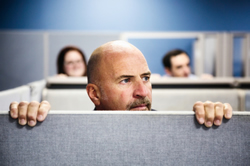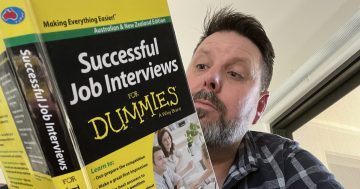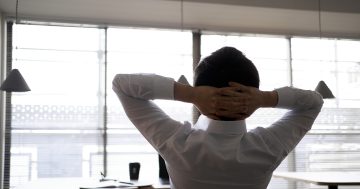Art Markman* says we are naturally inclined to judge each other, and open offices magnify that instinct.
 It’s natural to watch the actions of other people, and to judge them for doing things differently than you do.
It’s natural to watch the actions of other people, and to judge them for doing things differently than you do.
As comedian George Carlin said in a famous routine, “Have you ever noticed that anyone driving slower than you is an idiot, and anyone going faster is a maniac?”
The effects of all of this judgement are magnified in open office environments in which the behaviour of everyone is on display for all to see.
Because as natural as it can be to judge what other people are doing, it is probably making everyone in that open-office environment even less productive.
And that is on top of the hit you take in productivity just from the distractions.
You are being judged for what time you leave
For example, anyone who leaves the office at exactly 5 pm runs the risk of being labelled a slacker by anyone staying later.
As a result, people look around the office and wait for other people to leave before they head out.
If staying all of those extra hours made people more productive, there might be something valuable in working longer hours.
In general, though, there is a point of diminishing returns in which people spend more time engaged in “fake work” in which they are unproductively at their desk beyond an eight-hour day.
Indeed, Steve Glaveski recently argued for a six-hour workday for employees who have to stay mentally sharp and be creative.
So if collective judgement leads everyone to stick around work past their prime number of work hours, then everyone is going to be less happy and productive at work — just because everyone else can see them.
You are being judged for what you do at lunch
A similar thing happens with breaks.
People can see who is eating at their desks, and who avoids getting up for too long.
All of this behaviour can lead people to spend too much time in one place during the workday.
The hardest problems at work require taking breaks during the day.
When you are stuck on a problem, there is a good chance that you are being reminded of the same small set of solutions repeatedly.
To break that cycle, it is valuable to step away from your work for a while to let your memory reset.
A walk is helpful.
Changing your surroundings can also remind you of other things that might be useful for solving a problem.
What you can do to use comparisons more effectively
When you judge others, it is typically because you perceive them as different from yourself.
Research on social groups in psychology distinguishes between “in-group” members — who are the people that are part of your team — and “out-group members,” who are part of some other team.
You tend to judge people from out-groups who do things differently than you do, but to appreciate when people from your in-group do things differently.
You are also more likely to compete with members of out-groups and cooperate with members of your in-group.
When you see other people in the office, remind yourself that they are all your teammates.
Your goal is not to outdo them, but to help everyone be most productive.
If someone consistently leaves the office at 5 pm, don’t look down your nose at them, just ask yourself whether they are getting their work done successfully.
If they are, then be glad that you have such an efficient worker as part of your group.
And while you’re at it, if you’re watching other people’s behaviour, see what you can learn from them.
When you judge others, the implicit assumption is that your orientation is better than theirs, and so when someone does something differently than you would do it, they are wrong in some way.
But what if your colleagues actually know things you don’t?
In that case, your judgement gets in the way of discovering a new and better way to get your work done.
One of the best ways to improve your performance at work is to assume that everyone around you has something to teach you.
That way, the fishbowl that is the open office provides you with lots of opportunities to view new and better ways to succeed.
* Art Markman is a Professor of Psychology and Marketing at the University of Texas, USA and Founding Director of the Program in the Human Dimensions of Organisations.
This article first appeared at www.fastcompany.com.











